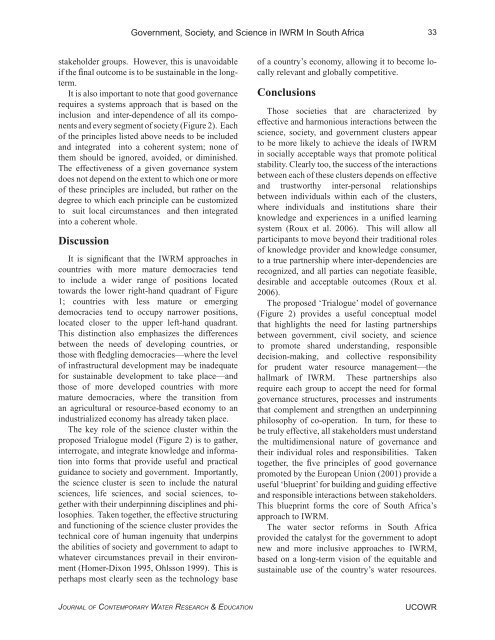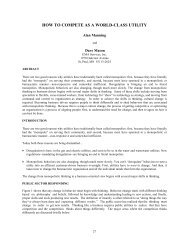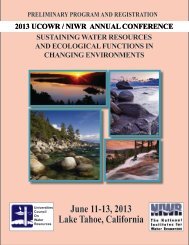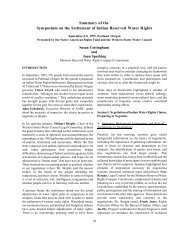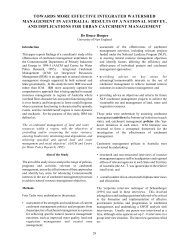32Ashton, Turton, <strong>and</strong> Rouxassumption that all stakeholders can be engaged<strong>and</strong> informed in a uniform way regardless <strong>of</strong> theircultural <strong>and</strong> historical background, social structures<strong>and</strong> preferences, educational levels, <strong>and</strong> literacy<strong>and</strong> linguistic abilities. The situation is aggravatedin those communities that are plagued by historicaldisadvantages <strong>and</strong> pervasive poverty. Externalinterventions are needed to “level the playingfield” before these individuals <strong>and</strong> communitiescan participate effectively <strong>and</strong> equitably withtheir peers in decision-making processes (Ashtonin press). Where no provision is made to enabledisadvantaged stakeholders to participate effectivelyin decision-making processes, this situationis <strong>of</strong>ten referred to as “the illusion <strong>of</strong> inclusion”(Ashton <strong>and</strong> Chonguiça 2003).In the end, an ideal governance system has toensure that stakeholder engagement at all levelsis carefully balanced <strong>and</strong> integrated to enable thebest <strong>and</strong> most sustainable outcomes to be agreedupon <strong>and</strong> achieved (Ashton in press). However,despite clear evidence <strong>of</strong> the benefits to be gainedby ensuring that the broader public are correctlyengaged in decision-making processes, there isstill surprisingly little guidance available on howbest to achieve this ideal.Given the complex <strong>and</strong> multi-dimensionalnature <strong>of</strong> governance, it is important to ensure thatall participants clearly underst<strong>and</strong> their roles <strong>and</strong>responsibilities, <strong>and</strong> adhere to a set <strong>of</strong> commonprinciples that define “good governance” (EuropeanUnion 2001). To achieve this, stakeholdersmust first agree on the roles <strong>and</strong> responsibilities <strong>of</strong>every group <strong>and</strong> individual participant, the rules<strong>and</strong> procedures that will guide <strong>and</strong> govern theinteractions between them, what form the anticipatedoutcomes <strong>of</strong> the decision-making process will take<strong>and</strong> how these will be implemented. The prioradoption <strong>of</strong> such an agreed set <strong>of</strong> procedural <strong>and</strong>behavioral guidelines provides a strongly cohesiveforce that helps all participants to accept ownership<strong>of</strong> both the participatory process <strong>and</strong> the finaloutcomes <strong>of</strong> that process (Ashton in press).Adherence to the guiding ethics <strong>and</strong> values thatcharacterize “good governance” will help to ensurethat a governance system within a particular contextis effective, efficient, <strong>and</strong> socially relevant (Ashtonin press). Clearly, therefore, good governancehas to be based on, <strong>and</strong> incorporate, the attitudes,values, <strong>and</strong> practices <strong>of</strong> society while also givingmeaning to society’s aspirations <strong>and</strong> objectives.The European Union (EU) has presented a usefulset <strong>of</strong> five principles <strong>of</strong> good governance as thebasis for attempts to improve its performance(European Union 2001). These principles are:••••Openness – where governance institutionsare transparent <strong>and</strong> inclusive, communicatingfreely about what they do <strong>and</strong> the decisionsthat are taken, using language that is accessible<strong>and</strong> underst<strong>and</strong>able to all stakeholders;Participation – where the quality, relevance,<strong>and</strong> effectiveness <strong>of</strong> policies, legislation,regulation, <strong>and</strong> practice depend on publicparticipation from conception to implementation,to create greater confidence in the institutions <strong>of</strong>governance <strong>and</strong> the outcomes <strong>of</strong> policy;Accountability – where every role in thelegislative, administrative, <strong>and</strong> executiveprocesses is made clear, <strong>and</strong> where there isappropriate clarity <strong>and</strong> responsibility fromeveryone who is involved in developing <strong>and</strong>implementing policy at every level;Effectiveness – where policies are timely<strong>and</strong> appropriate, delivering what is needed,based on decisions made during participativedecision-making processes; <strong>and</strong>• Coherence – where policies <strong>and</strong> implementationactions are consistent with otherinitiatives, <strong>and</strong> are clearly aligned <strong>and</strong> wellunderstood by all participants.In an African context, the first three <strong>of</strong> theseprinciples require special prominence to ensure thatall stakeholders are able to participate equitably.This necessity is driven by the need to deal withproblems related to low levels <strong>of</strong> literacy <strong>and</strong> alack <strong>of</strong> familiarity with technical terminology,widespread poverty that is <strong>of</strong>ten sustained bycontinuing inequalities in terms <strong>of</strong> access toresources <strong>and</strong> finance, <strong>and</strong> a lack <strong>of</strong> familiaritywith democratic processes—<strong>of</strong>ten accompaniedby mistrust <strong>of</strong> unfamiliar representatives <strong>and</strong> “selfappointedleaders.” Resolution <strong>of</strong> such inequalitiesinevitably takes time to achieve <strong>and</strong>, unfortunately,can also lead to some dissatisfaction among certainUCOWRJOURNAL OF CONTEMPORARY WATER RESEARCH & EDUCATION
Government, Society, <strong>and</strong> Science in IWRM In South Africa33stakeholder groups. However, this is unavoidableif the final outcome is to be sustainable in the longterm.It is also important to note that good governancerequires a systems approach that is based on theinclusion <strong>and</strong> inter-dependence <strong>of</strong> all its components<strong>and</strong> every segment <strong>of</strong> society (Figure 2). Each<strong>of</strong> the principles listed above needs to be included<strong>and</strong> integrated into a coherent system; none <strong>of</strong>them should be ignored, avoided, or diminished.The effectiveness <strong>of</strong> a given governance systemdoes not depend on the extent to which one or more<strong>of</strong> these principles are included, but rather on thedegree to which each principle can be customizedto suit local circumstances <strong>and</strong> then integratedinto a coherent whole.DiscussionIt is significant that the IWRM approaches incountries with more mature democracies tendto include a wider range <strong>of</strong> positions locatedtowards the lower right-h<strong>and</strong> quadrant <strong>of</strong> Figure1; countries with less mature or emergingdemocracies tend to occupy narrower positions,located closer to the upper left-h<strong>and</strong> quadrant.This distinction also emphasizes the differencesbetween the needs <strong>of</strong> developing countries, orthose with fledgling democracies—where the level<strong>of</strong> infrastructural development may be inadequatefor sustainable development to take place—<strong>and</strong>those <strong>of</strong> more developed countries with moremature democracies, where the transition froman agricultural or resource-based economy to anindustrialized economy has already taken place.The key role <strong>of</strong> the science cluster within theproposed Trialogue model (Figure 2) is to gather,interrogate, <strong>and</strong> integrate knowledge <strong>and</strong> informationinto forms that provide useful <strong>and</strong> practicalguidance to society <strong>and</strong> government. Importantly,the science cluster is seen to include the naturalsciences, life sciences, <strong>and</strong> social sciences, togetherwith their underpinning disciplines <strong>and</strong> philosophies.Taken together, the effective structuring<strong>and</strong> functioning <strong>of</strong> the science cluster provides thetechnical core <strong>of</strong> human ingenuity that underpinsthe abilities <strong>of</strong> society <strong>and</strong> government to adapt towhatever circumstances prevail in their environment(Homer-Dixon 1995, Ohlsson 1999). This isperhaps most clearly seen as the technology base<strong>of</strong> a country’s economy, allowing it to become locallyrelevant <strong>and</strong> globally competitive.ConclusionsThose societies that are characterized byeffective <strong>and</strong> harmonious interactions between thescience, society, <strong>and</strong> government clusters appearto be more likely to achieve the ideals <strong>of</strong> IWRMin socially acceptable ways that promote politicalstability. Clearly too, the success <strong>of</strong> the interactionsbetween each <strong>of</strong> these clusters depends on effective<strong>and</strong> trustworthy inter-personal relationshipsbetween individuals within each <strong>of</strong> the clusters,where individuals <strong>and</strong> institutions share theirknowledge <strong>and</strong> experiences in a unified learningsystem (Roux et al. 2006). This will allow allparticipants to move beyond their traditional roles<strong>of</strong> knowledge provider <strong>and</strong> knowledge consumer,to a true partnership where inter-dependencies arerecognized, <strong>and</strong> all parties can negotiate feasible,desirable <strong>and</strong> acceptable outcomes (Roux et al.2006).The proposed ‘Trialogue’ model <strong>of</strong> governance(Figure 2) provides a useful conceptual modelthat highlights the need for lasting partnershipsbetween government, civil society, <strong>and</strong> scienceto promote shared underst<strong>and</strong>ing, responsibledecision-making, <strong>and</strong> collective responsibilityfor prudent water resource management—thehallmark <strong>of</strong> IWRM. These partnerships alsorequire each group to accept the need for formalgovernance structures, processes <strong>and</strong> instrumentsthat complement <strong>and</strong> strengthen an underpinningphilosophy <strong>of</strong> co-operation. In turn, for these tobe truly effective, all stakeholders must underst<strong>and</strong>the multidimensional nature <strong>of</strong> governance <strong>and</strong>their individual roles <strong>and</strong> responsibilities. Takentogether, the five principles <strong>of</strong> good governancepromoted by the European Union (2001) provide auseful ‘blueprint’ for building <strong>and</strong> guiding effective<strong>and</strong> responsible interactions between stakeholders.This blueprint forms the core <strong>of</strong> South Africa’sapproach to IWRM.The water sector reforms in South Africaprovided the catalyst for the government to adoptnew <strong>and</strong> more inclusive approaches to IWRM,based on a long-term vision <strong>of</strong> the equitable <strong>and</strong>sustainable use <strong>of</strong> the country’s water resources.JOURNAL OF CONTEMPORARY WATER RESEARCH & EDUCATIONUCOWR
- Page 3: Journal of ContemporaryWater Resear
- Page 6 and 7: 2Bruce Hooperinstitutional, and tem
- Page 11 and 12: IWRM: Governance, Best Practice, an
- Page 13 and 14: IWRM: Defi nitions and Conceptual M
- Page 15 and 16: IWRM: Defi nitions and Conceptual M
- Page 17 and 18: IWRM: Defi nitions and Conceptual M
- Page 19: IWRM: Defi nitions and Conceptual M
- Page 22 and 23: 18Cardwell. Cole, Cartwright, and M
- Page 24 and 25: 20Mostert26 water boards responsibl
- Page 26 and 27: 22MostertTable 1. Third National Wa
- Page 28 and 29: 24MostertImplementationThe ambitiou
- Page 30 and 31: 26MostertBiswas, A. K. 2004b. Respo
- Page 32 and 33: 28UNIVERSITIES COUNCIL ON WATER RES
- Page 34 and 35: 30Ashton, Turton, and Rouxresource
- Page 38 and 39: 34Ashton, Turton, and RouxEffective
- Page 40 and 41: 36UNIVERSITIES COUNCIL ON WATER RES
- Page 42 and 43: 38Hussey and Doversin water policy
- Page 44 and 45: 40Hussey and Dovers1994 Council of
- Page 46 and 47: 42Hussey and Doversestablished Thes
- Page 48 and 49: 44Hussey and DoversTable 1. Typolog
- Page 50 and 51: 46Hussey and Doversassessment appro
- Page 52 and 53: 48Hussey and Doverspolicy goals.Bey
- Page 54 and 55: 50Hussey and DoversFrawley, K. 1994
- Page 56 and 57: 52Mitchelloften took three to four
- Page 58 and 59: 54Mitchelltree preservation plans;
- Page 60 and 61: 56UNIVERSITIES COUNCIL ON WATER RES
- Page 62 and 63: 58Genskow and Borna series of chall
- Page 64 and 65: 60Genskow and BornTable 1. Watershe
- Page 66 and 67: 62Genskow and Bornthe first Dungene
- Page 68 and 69: 64Genskow and BornWashington, DC.Ko
- Page 70 and 71: 66Green and Fernández-BilbaoWithin
- Page 72 and 73: 68Green and Fernández-Bilbaosubjec
- Page 74 and 75: 70Green and Fernández-Bilbaoinflue
- Page 76 and 77: 72Green and Fernández-BilbaoBerbel
- Page 78 and 79: 74UNIVERSITIES COUNCIL ON WATER RES
- Page 80 and 81: 76BallweberEstablish AdvisoryCommit
- Page 82 and 83: 78Ballweberattributes in others (Ch
- Page 84 and 85: 80UNIVERSITIES COUNCIL ON WATER RES
- Page 86 and 87:
82Barreiraand ground water. To this
- Page 88 and 89:
84Barreirawith other states for int
- Page 90 and 91:
86UNIVERSITIES COUNCIL ON WATER RES
- Page 92 and 93:
88Davis and ThrelfallResource Manag
- Page 94 and 95:
90Davis and ThrelfallTable 2. Thirt
- Page 96 and 97:
92Davis and Threlfallby regional an
- Page 98 and 99:
94Davis and Threlfallenforcement, a
- Page 100 and 101:
96Davis and Threlfallhusbandry prac
- Page 102 and 103:
98Davis and ThrelfallNew Zealand: T
- Page 104 and 105:
100UNIVERSITIES COUNCIL ON WATER RE
- Page 106 and 107:
102Lamoree and van SteenbergenIt is
- Page 108 and 109:
104Lamoree and van Steenbergenand n
- Page 110 and 111:
106Lamoree and van Steenbergeninter
- Page 112 and 113:
108BourgetWorks Planner Capability
- Page 114 and 115:
110Bourgetwith over 600 people resp
- Page 116 and 117:
112Bourgetgovernment’s intrusion
- Page 118 and 119:
114Bourget4.management, drought man
- Page 120 and 121:
116McKayFigure 1. The four paradigm
- Page 122 and 123:
118McKay4. Paradigm 4 (which commen
- Page 124 and 125:
120McKaythree main functions:1. ass
- Page 126 and 127:
122McKayState Implementation of the
- Page 128 and 129:
124McKayTable 2. Corporate governan
- Page 130 and 131:
126McKayFigure 4. Qu. 26 - The ESD
- Page 132 and 133:
128McKayFigure 7. Qu.93- This organ
- Page 134 and 135:
130McKayBrundtland Report. 1987. Ou
- Page 136 and 137:
132UCOWR BOARD OF DIRECTORS/COMMITT
- Page 138 and 139:
134BENEFITS OF UCOWR MEMBERSHIPThe
- Page 140 and 141:
136Past Issues of the Journal of Co
- Page 142 and 143:
138Academic Organizations Membershi
- Page 144 and 145:
140Individual Membership Applicatio
- Page 146 and 147:
Universities Council on Water Resou
- Page 148:
Integrated Water Resources Manageme


